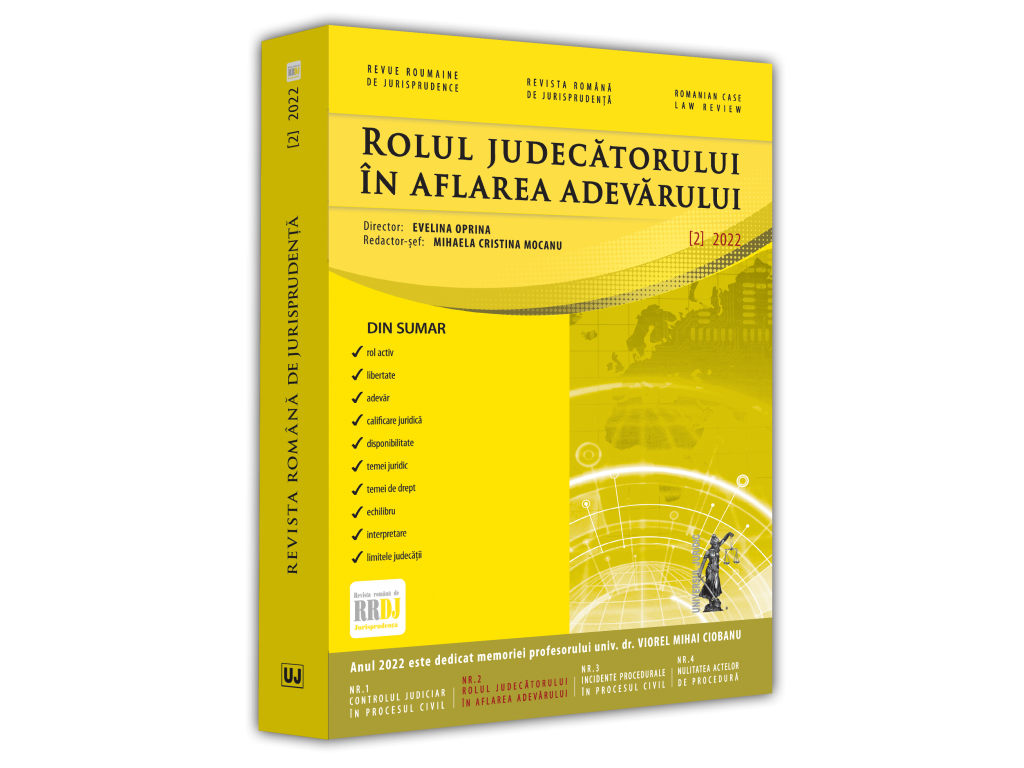The judge between the accusatory and inquisitorial procedure, between the duty to find out the truth by all legal means and the obligation to respect the availability of the parties and the limits of the investigation
DEZBATERI
Abstract
What is the role of the judge in finding the truth? This is the most profound question a judge must answer throughout his or her career. Over time, the judge will oscillate between accusatory and inquisitorial proceedings and will eventually find his way, his balance, using all the legal means at his disposal to fulfil his mission, which is to find the truth and avoid error. On his way to the truth, the judge must always remain active, ask for clarifications, administer all the evidence he deems necessary, be vigilant in analysing the position of the parties, remaining necessarily equidistant towards them, respecting their equality before the law and the court, carefully qualifying the requests for the purpose for which they were formulated, without however modifying their will because the principle of availability is of the essence of the civil process, and the violation of the limits of the investiture is not allowed.
The present article starts from the definition and understanding of the accusatory and inquisitorial procedure between which the legislator chooses when establishing the role of the judge in the proceedings and the establishment of the judicial truth; it then reviews the history of the main regulations in Romanian law regarding the role of the judge, revealing the evolution from a French-inspired accusatory procedure to a procedure with strong inquisitorial overtones, while trying to choose a middle way with the enhancement of the principle of availability of the parties.
The article is then built mainly around Article 22 of the Civil Procedure Code, which is at the heart of the regulation of the judge's role in finding the truth, and raises essential but sensitive issues for the judge who seeks to define his mission and perform it as well as possible. Settling disputes according to the rules of law applicable to it, rules of law that are constantly changing, increasingly unclear, inconsistent, inconsistent and, more recently, increasingly unconstitutional, makes the judge's role more difficult, sometimes turning him into a creator, even a "magician", who must give the rule logic, coherence and consistency in the dispute before the court, in order to pronounce a legal and fair solution. The need to find out the truth pushes the active judge to ask the parties for more evidence, even to impose it despite their resistance or passivity, while always being careful to remain fair to the parties and not to become their advocate. The judge must "read", understand the will of the parties, qualify it correctly, when such qualification is required, but without ever changing the will of the parties, without violating the limits of investiture and availability. The comparative law analysis and the frequent references to French legislation and case law can be useful in deepening the meaning of the institutions analysed, all the more so as both the old Code of Civil Procedure of 1865 and the current Code were inspired by and acquired a strong influence of French law.
And above all, in all of this, the judge must remain upright, free, independent, subject only to the law, ensuring the guarantee of a fair trial, judged in optimal and reasonable time, as provided for in Article 6 ECHR, always acting in good faith and fairly.
It's a bit like tightrope walking, you have to keep your balance and your spine straight until the end of the "performance" because any slight hesitation or tilt in one direction or another can be fatal.
Keywords: the role of the judge, the accusatory procedure, the inquisitorial procedure, finding the truth, the principle of availability








